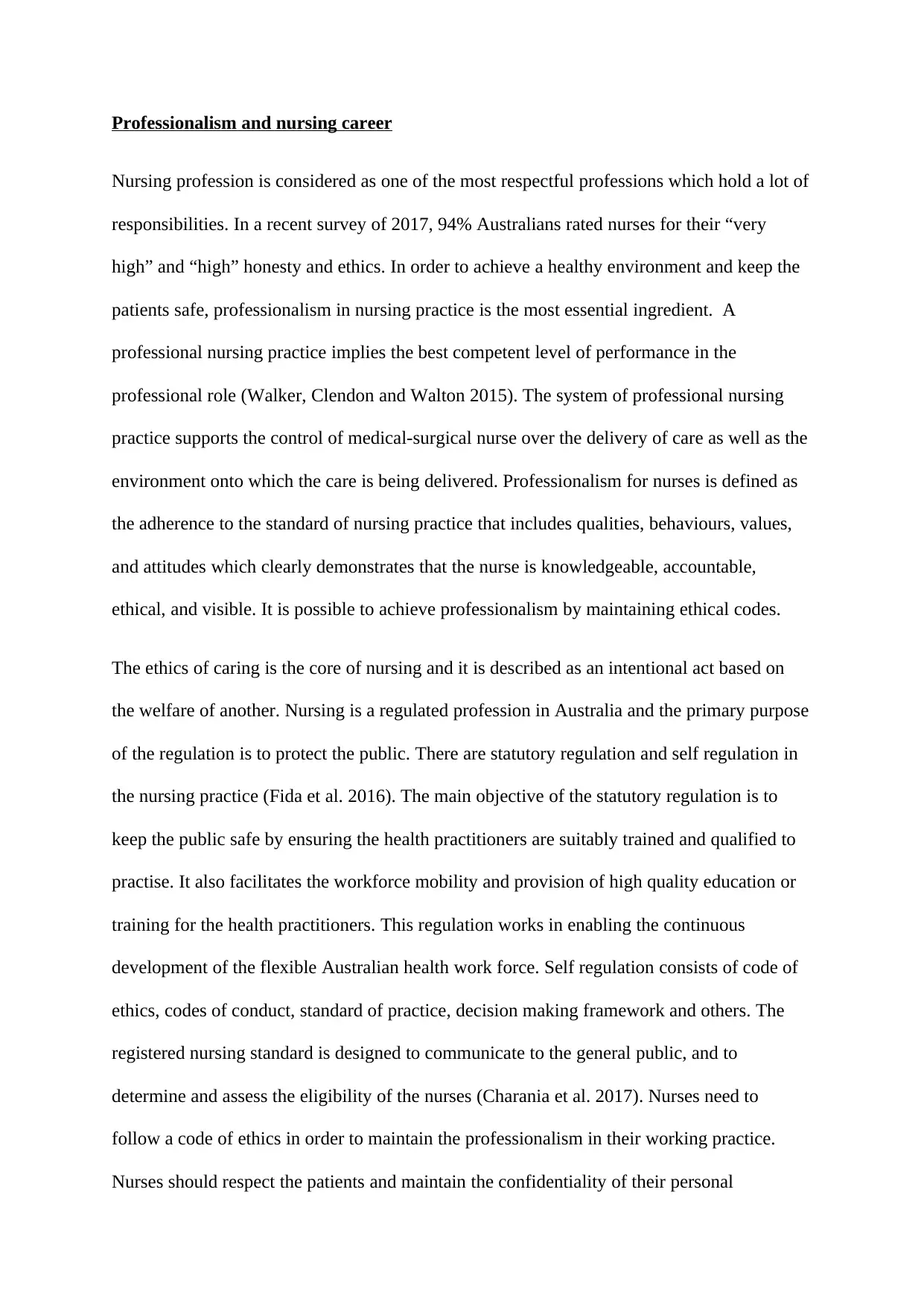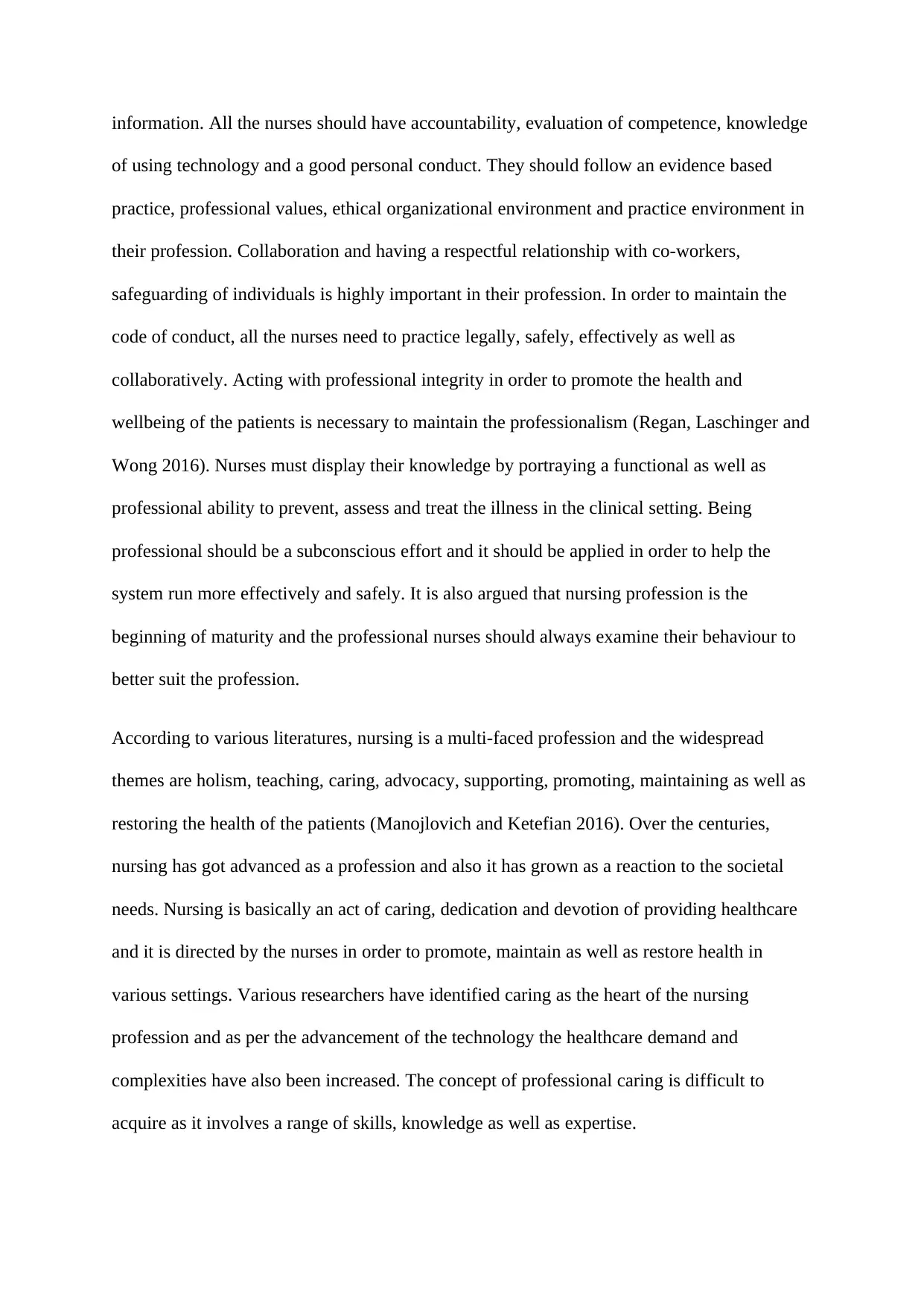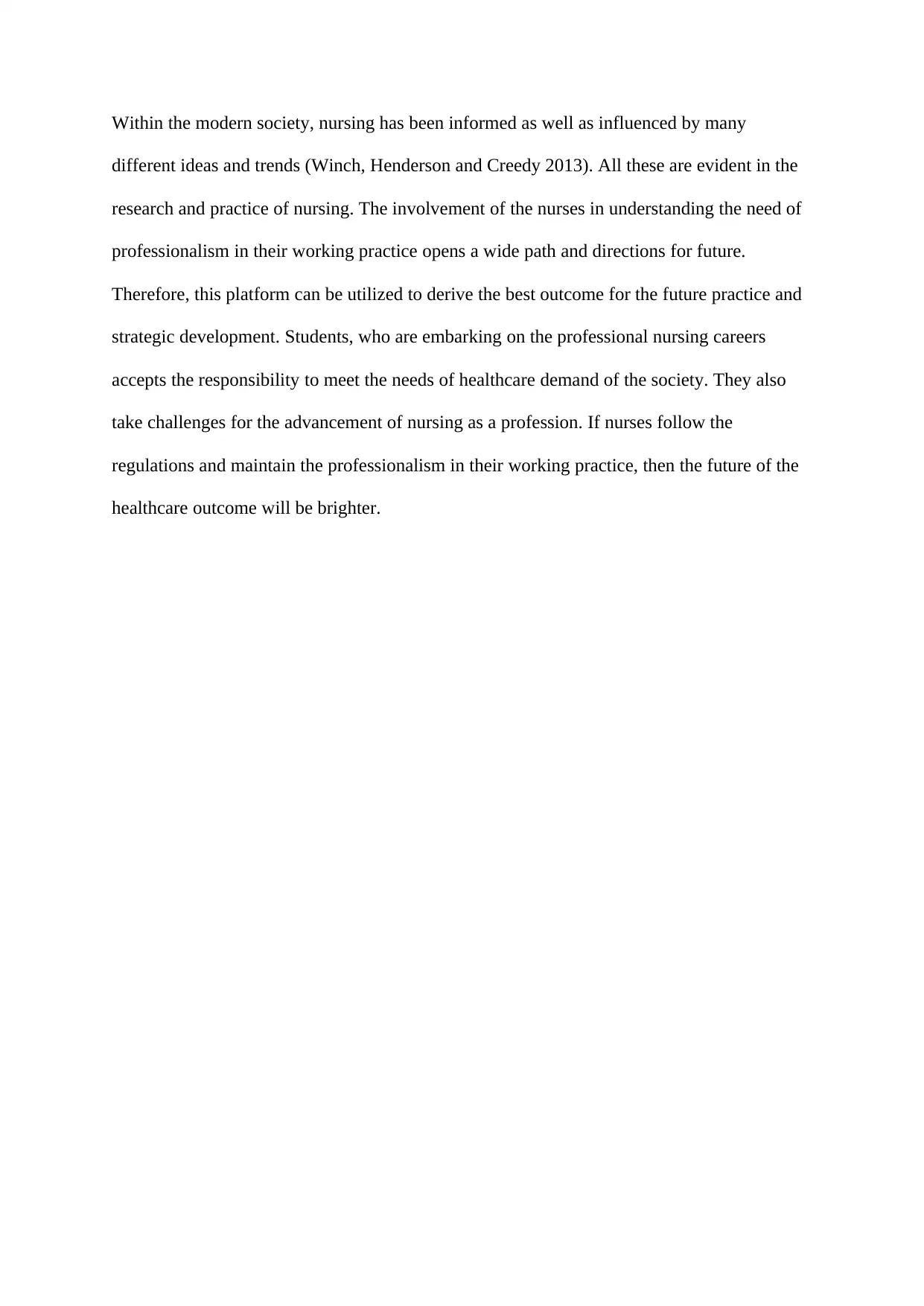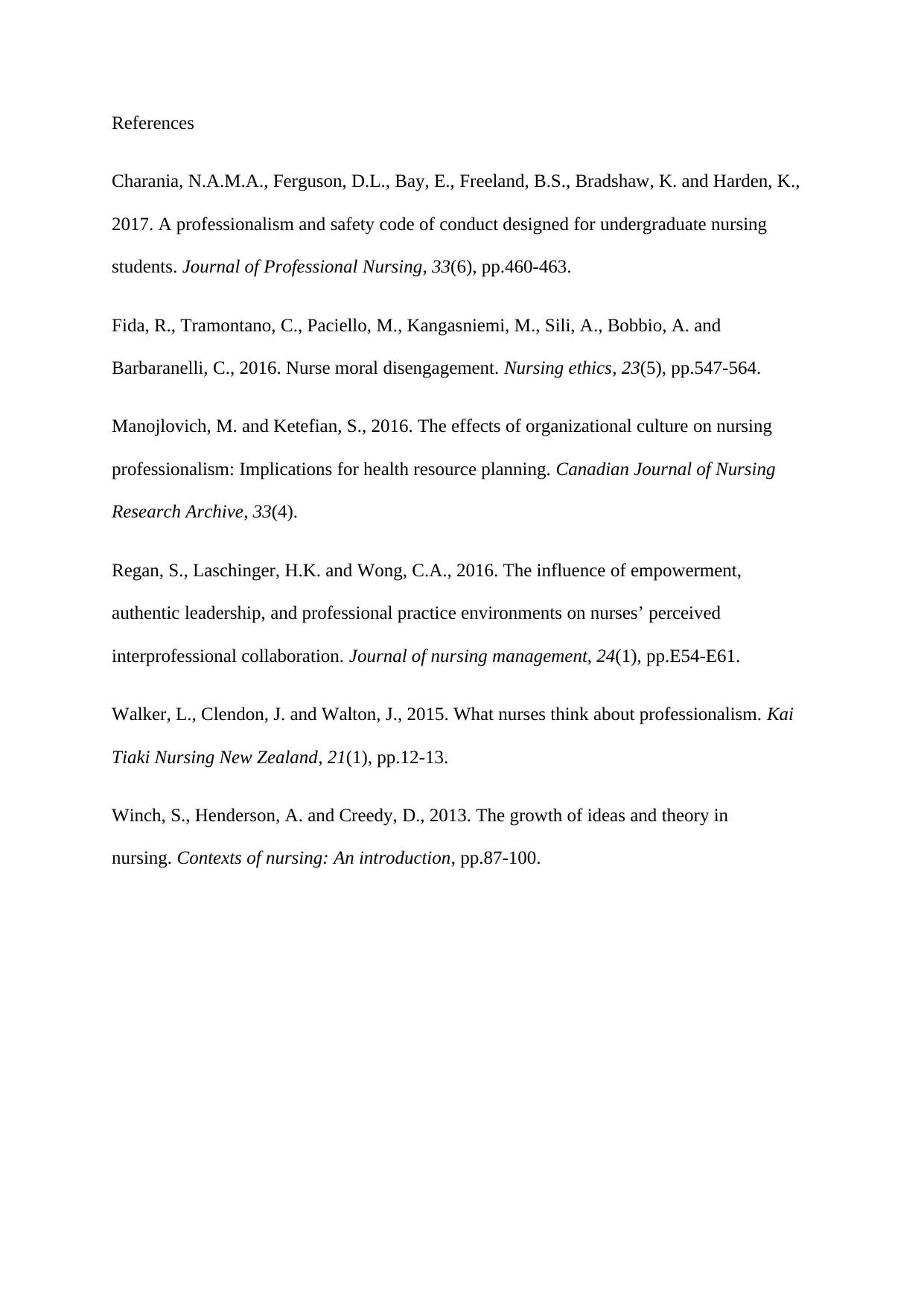Professionalism in Nursing: Ethical Standards and Career Implications
VerifiedAdded on 2023/04/23
|4
|1127
|239
Essay
AI Summary
This essay explores the crucial role of professionalism in nursing, highlighting its impact on patient safety and healthcare outcomes. It emphasizes adherence to ethical standards, codes of conduct, and regulatory frameworks within the Australian nursing context. The essay further discusses the importance of ethical behavior, accountability, continuous development, and collaboration among nurses. It also touches upon the evolving nature of nursing, driven by societal needs and technological advancements. The core of nursing, characterized by caring, dedication, and devotion, is examined, emphasizing the need for nurses to understand and embrace professionalism for future strategic development. Ultimately, the essay concludes that by upholding regulations and maintaining professionalism, nurses can contribute to a brighter future for healthcare.

Professionalism and nursing career
Nursing profession is considered as one of the most respectful professions which hold a lot of
responsibilities. In a recent survey of 2017, 94% Australians rated nurses for their “very
high” and “high” honesty and ethics. In order to achieve a healthy environment and keep the
patients safe, professionalism in nursing practice is the most essential ingredient. A
professional nursing practice implies the best competent level of performance in the
professional role (Walker, Clendon and Walton 2015). The system of professional nursing
practice supports the control of medical-surgical nurse over the delivery of care as well as the
environment onto which the care is being delivered. Professionalism for nurses is defined as
the adherence to the standard of nursing practice that includes qualities, behaviours, values,
and attitudes which clearly demonstrates that the nurse is knowledgeable, accountable,
ethical, and visible. It is possible to achieve professionalism by maintaining ethical codes.
The ethics of caring is the core of nursing and it is described as an intentional act based on
the welfare of another. Nursing is a regulated profession in Australia and the primary purpose
of the regulation is to protect the public. There are statutory regulation and self regulation in
the nursing practice (Fida et al. 2016). The main objective of the statutory regulation is to
keep the public safe by ensuring the health practitioners are suitably trained and qualified to
practise. It also facilitates the workforce mobility and provision of high quality education or
training for the health practitioners. This regulation works in enabling the continuous
development of the flexible Australian health work force. Self regulation consists of code of
ethics, codes of conduct, standard of practice, decision making framework and others. The
registered nursing standard is designed to communicate to the general public, and to
determine and assess the eligibility of the nurses (Charania et al. 2017). Nurses need to
follow a code of ethics in order to maintain the professionalism in their working practice.
Nurses should respect the patients and maintain the confidentiality of their personal
Nursing profession is considered as one of the most respectful professions which hold a lot of
responsibilities. In a recent survey of 2017, 94% Australians rated nurses for their “very
high” and “high” honesty and ethics. In order to achieve a healthy environment and keep the
patients safe, professionalism in nursing practice is the most essential ingredient. A
professional nursing practice implies the best competent level of performance in the
professional role (Walker, Clendon and Walton 2015). The system of professional nursing
practice supports the control of medical-surgical nurse over the delivery of care as well as the
environment onto which the care is being delivered. Professionalism for nurses is defined as
the adherence to the standard of nursing practice that includes qualities, behaviours, values,
and attitudes which clearly demonstrates that the nurse is knowledgeable, accountable,
ethical, and visible. It is possible to achieve professionalism by maintaining ethical codes.
The ethics of caring is the core of nursing and it is described as an intentional act based on
the welfare of another. Nursing is a regulated profession in Australia and the primary purpose
of the regulation is to protect the public. There are statutory regulation and self regulation in
the nursing practice (Fida et al. 2016). The main objective of the statutory regulation is to
keep the public safe by ensuring the health practitioners are suitably trained and qualified to
practise. It also facilitates the workforce mobility and provision of high quality education or
training for the health practitioners. This regulation works in enabling the continuous
development of the flexible Australian health work force. Self regulation consists of code of
ethics, codes of conduct, standard of practice, decision making framework and others. The
registered nursing standard is designed to communicate to the general public, and to
determine and assess the eligibility of the nurses (Charania et al. 2017). Nurses need to
follow a code of ethics in order to maintain the professionalism in their working practice.
Nurses should respect the patients and maintain the confidentiality of their personal
Paraphrase This Document
Need a fresh take? Get an instant paraphrase of this document with our AI Paraphraser

information. All the nurses should have accountability, evaluation of competence, knowledge
of using technology and a good personal conduct. They should follow an evidence based
practice, professional values, ethical organizational environment and practice environment in
their profession. Collaboration and having a respectful relationship with co-workers,
safeguarding of individuals is highly important in their profession. In order to maintain the
code of conduct, all the nurses need to practice legally, safely, effectively as well as
collaboratively. Acting with professional integrity in order to promote the health and
wellbeing of the patients is necessary to maintain the professionalism (Regan, Laschinger and
Wong 2016). Nurses must display their knowledge by portraying a functional as well as
professional ability to prevent, assess and treat the illness in the clinical setting. Being
professional should be a subconscious effort and it should be applied in order to help the
system run more effectively and safely. It is also argued that nursing profession is the
beginning of maturity and the professional nurses should always examine their behaviour to
better suit the profession.
According to various literatures, nursing is a multi-faced profession and the widespread
themes are holism, teaching, caring, advocacy, supporting, promoting, maintaining as well as
restoring the health of the patients (Manojlovich and Ketefian 2016). Over the centuries,
nursing has got advanced as a profession and also it has grown as a reaction to the societal
needs. Nursing is basically an act of caring, dedication and devotion of providing healthcare
and it is directed by the nurses in order to promote, maintain as well as restore health in
various settings. Various researchers have identified caring as the heart of the nursing
profession and as per the advancement of the technology the healthcare demand and
complexities have also been increased. The concept of professional caring is difficult to
acquire as it involves a range of skills, knowledge as well as expertise.
of using technology and a good personal conduct. They should follow an evidence based
practice, professional values, ethical organizational environment and practice environment in
their profession. Collaboration and having a respectful relationship with co-workers,
safeguarding of individuals is highly important in their profession. In order to maintain the
code of conduct, all the nurses need to practice legally, safely, effectively as well as
collaboratively. Acting with professional integrity in order to promote the health and
wellbeing of the patients is necessary to maintain the professionalism (Regan, Laschinger and
Wong 2016). Nurses must display their knowledge by portraying a functional as well as
professional ability to prevent, assess and treat the illness in the clinical setting. Being
professional should be a subconscious effort and it should be applied in order to help the
system run more effectively and safely. It is also argued that nursing profession is the
beginning of maturity and the professional nurses should always examine their behaviour to
better suit the profession.
According to various literatures, nursing is a multi-faced profession and the widespread
themes are holism, teaching, caring, advocacy, supporting, promoting, maintaining as well as
restoring the health of the patients (Manojlovich and Ketefian 2016). Over the centuries,
nursing has got advanced as a profession and also it has grown as a reaction to the societal
needs. Nursing is basically an act of caring, dedication and devotion of providing healthcare
and it is directed by the nurses in order to promote, maintain as well as restore health in
various settings. Various researchers have identified caring as the heart of the nursing
profession and as per the advancement of the technology the healthcare demand and
complexities have also been increased. The concept of professional caring is difficult to
acquire as it involves a range of skills, knowledge as well as expertise.

Within the modern society, nursing has been informed as well as influenced by many
different ideas and trends (Winch, Henderson and Creedy 2013). All these are evident in the
research and practice of nursing. The involvement of the nurses in understanding the need of
professionalism in their working practice opens a wide path and directions for future.
Therefore, this platform can be utilized to derive the best outcome for the future practice and
strategic development. Students, who are embarking on the professional nursing careers
accepts the responsibility to meet the needs of healthcare demand of the society. They also
take challenges for the advancement of nursing as a profession. If nurses follow the
regulations and maintain the professionalism in their working practice, then the future of the
healthcare outcome will be brighter.
different ideas and trends (Winch, Henderson and Creedy 2013). All these are evident in the
research and practice of nursing. The involvement of the nurses in understanding the need of
professionalism in their working practice opens a wide path and directions for future.
Therefore, this platform can be utilized to derive the best outcome for the future practice and
strategic development. Students, who are embarking on the professional nursing careers
accepts the responsibility to meet the needs of healthcare demand of the society. They also
take challenges for the advancement of nursing as a profession. If nurses follow the
regulations and maintain the professionalism in their working practice, then the future of the
healthcare outcome will be brighter.
⊘ This is a preview!⊘
Do you want full access?
Subscribe today to unlock all pages.

Trusted by 1+ million students worldwide

References
Charania, N.A.M.A., Ferguson, D.L., Bay, E., Freeland, B.S., Bradshaw, K. and Harden, K.,
2017. A professionalism and safety code of conduct designed for undergraduate nursing
students. Journal of Professional Nursing, 33(6), pp.460-463.
Fida, R., Tramontano, C., Paciello, M., Kangasniemi, M., Sili, A., Bobbio, A. and
Barbaranelli, C., 2016. Nurse moral disengagement. Nursing ethics, 23(5), pp.547-564.
Manojlovich, M. and Ketefian, S., 2016. The effects of organizational culture on nursing
professionalism: Implications for health resource planning. Canadian Journal of Nursing
Research Archive, 33(4).
Regan, S., Laschinger, H.K. and Wong, C.A., 2016. The influence of empowerment,
authentic leadership, and professional practice environments on nurses’ perceived
interprofessional collaboration. Journal of nursing management, 24(1), pp.E54-E61.
Walker, L., Clendon, J. and Walton, J., 2015. What nurses think about professionalism. Kai
Tiaki Nursing New Zealand, 21(1), pp.12-13.
Winch, S., Henderson, A. and Creedy, D., 2013. The growth of ideas and theory in
nursing. Contexts of nursing: An introduction, pp.87-100.
Charania, N.A.M.A., Ferguson, D.L., Bay, E., Freeland, B.S., Bradshaw, K. and Harden, K.,
2017. A professionalism and safety code of conduct designed for undergraduate nursing
students. Journal of Professional Nursing, 33(6), pp.460-463.
Fida, R., Tramontano, C., Paciello, M., Kangasniemi, M., Sili, A., Bobbio, A. and
Barbaranelli, C., 2016. Nurse moral disengagement. Nursing ethics, 23(5), pp.547-564.
Manojlovich, M. and Ketefian, S., 2016. The effects of organizational culture on nursing
professionalism: Implications for health resource planning. Canadian Journal of Nursing
Research Archive, 33(4).
Regan, S., Laschinger, H.K. and Wong, C.A., 2016. The influence of empowerment,
authentic leadership, and professional practice environments on nurses’ perceived
interprofessional collaboration. Journal of nursing management, 24(1), pp.E54-E61.
Walker, L., Clendon, J. and Walton, J., 2015. What nurses think about professionalism. Kai
Tiaki Nursing New Zealand, 21(1), pp.12-13.
Winch, S., Henderson, A. and Creedy, D., 2013. The growth of ideas and theory in
nursing. Contexts of nursing: An introduction, pp.87-100.
1 out of 4
Related Documents
Your All-in-One AI-Powered Toolkit for Academic Success.
+13062052269
info@desklib.com
Available 24*7 on WhatsApp / Email
![[object Object]](/_next/static/media/star-bottom.7253800d.svg)
Unlock your academic potential
Copyright © 2020–2026 A2Z Services. All Rights Reserved. Developed and managed by ZUCOL.





